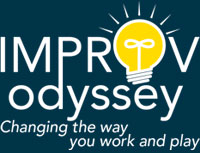Spolin Games: A Prescription for Living
Spolin’s structure for Improvisation is a metaphor for life
“I do feel that the day will come, I doubt that I will be here for it, when people will meet from everywhere, to play the games, to question Who Am I? Where am I? And What am I doing?” – Viola Spolin
The basis for improvisation is to ask to get a Who, a What, and a Where and then see what happens. But that is only half of the equation. Overlay that with a game or a particular focus and play with the constraint that creates. A game is a problem or set of problems to solve. Solve that problem and the outcome is Improvisation for the Theater.
In Spolin’s method, having a common focus generates the playing. Watching how a group of players solves the problem – not knowing the outcome and playing with all their wit and skill, surrendering to, accepting and celebrating that spontaneous discovery created a movement that has swept the world and influenced not only theater, but education, psychology, and all the arts. The use of play and games that calls on our whole self, our intuition, makes improvisation exciting and fun. We revel in the surprising ways each improvisation comes out, discovering along with the players what will happen. And we applaud it.
In a larger context, Who/What/Where + Focus, is a metaphor for life itself.
We are born and become a “Who”. We come into the world – a “Where” and we must have something to do – A “What”.
The What gives life to Improvising. It is working with a focus.
In improvisation, selecting a focus or where we put our attention determines the type of improv it will be. Funny, surprising, touching, or profound, we delight in being affected by the playing.
What we focus on determines our life path
In life the same is true. If you focus on yourself, good or bad, you have one kind of life. A focus on others, good or bad, is another kind of life. Focusing on the past, on pleasing others, on fearing uncertainty i.e., the future, preparing for the worst, come under the heading of focus. A focus generates the kind of life you will have.
In our life, along the way, we are given or get various focuses. We wrestle with fitting in, making money, finding meaning, love, and coping with the slings and arrows of outrageous fortune. And more often than not, we forget that the unfolding of this unknown event is fun, exciting and endlessly surprising, or should be. We should look forward with glee to the unfolding as we do in Improv. Sadly many of us do not. We forgot how to play.
Everything I needed to know, I learned in Kindergarten
Life was good as children because we had playmates; we played games, learned organically. In the period from birth to first grade, we mostly had fun. And then we went to school and were taught lessons others thought we should know. Unless we were very fortunate, learning in that way taught us that fun interfered with learning. And we forgot how to play.
Now we’re entering a new age. Viola Spolin called her work Kindergarten for the 21st century. Spolin’s system relies on the joy of play and counts on good coaches to keep us having fun.
So let us come together and play the games, and ask who am i? where am i? and what am I doing? And put a really cool focus into the mix and have fun!
By doing so, we will find ourselves on a path to the unknown, the intuitive and to the human spirit itself.


The Spolin quote at the top of this post is resonant with the teachings of many great wisdom teachers who propose that “who am i?” and “how do i know that i am?” is the most important inquiry one can undertake in life. See:
http://en.wikipedia.org/wiki/Self-enquiry
Thanks for the great post, Gary!